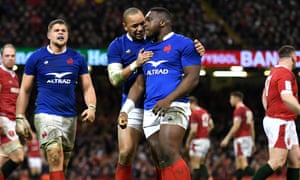The Breakdown | Wayne Pivac needs to shed Mr Nice Guy image if Wales are to prosper | Sport
Leo Durocher was a baseball coach who made Eddie Jones look like the what-hoing Bertie Wooster. Known as Leo the Lip, he managed the Brooklyn Dodgers after the second world war and is attributed with the saying “nice guys finish last”.
He was talking to reporters in 1946 about the New York Giants and their manager, Mel Ott, as they watched the side practise. Asked by one why he never acted as a nice guy, Durocher spat back: “Do you know a nicer guy than Mel Ott? Or any of the other Giants? Why, they’re the nicest guys in the world! And where are they? In seventh place! Nice guys! I’m not a nice guy – and I’m in first place.”
As Wales sift through the detritus of their Six Nations defence before the visit to Twickenham on Saturday, the question can be asked whether, in the post-Warren Gatland era, they have become too nice. It was not something of which Gatland, always ready to rattle opponents with a barb or two, was ever accused, nor his second lieutenant Shaun Edwards, who could turn the hardest player wobbly with a glare.
Wayne Pivac replaced Gatland with a brief to bring a sense of adventure back to Wales after what some saw as the tactical austerity of the previous 12 years. An ultimately comfortable victory against Italy was followed by a repeat of the 10-point loss they had endured in Dublin two years earlier and a first home defeat by France in the championship for 10 years.
Wales have been looking to live up to a new ideal and their performance against France was more rounded than it had been in the three previous meetings between the sides, all of which they had won by tight margins, but also more naive. Under Gatland they developed the ability to prevail at the end – think England in Cardiff last year – and beat teams through force, the way they won the grand slam against Ireland 12 months ago.
The defeats against Ireland and France each contained a similar moment when the outcome was in the balance. Wales had an attacking scrum in the final quarter and on each occasion it collapsed. They were penalised, much to their disgust, believing the referee had been conned on each occasion by the opposition tighthead, boring in on the opposite side of the scrum where the referee was standing and putting such pressure on the Welsh front row that they could not stay up.
Wales had conceded three penalties in the scrum against Italy that they felt had gone the wrong way and the following week Pivac talked about painting the right picture for referees by scrummaging straight. That got nowhere in Dublin and ahead of the France match, the prop Wyn Jones was wheeled out to claim Les Bleus cheated in the scrum by boring in. A French prop duly received a yellow card in Cardiff, but at the moment of reckoning it was France who got the decision.

Wales should not be relying on referees, especially in an area such as the scrum where most officials just want to see the ball emerge. They should have sorted out the issues themselves and when Demba Bamba came on they would have known, after the England match in Paris, that scrummaging straight was not his raison d’etre. England’s front rowers Joe Marler, Ellis Genge and Kyle Sinckler will not be spending the week poring over the rule book, the latter two very much in the image of their head coach, abrasive and confrontational.
England will look to push Wales around, as they did Ireland in the last round. Gatland’s Wales talked about earning the right to play, which translated meant winning the battle of the gainline and asserting themselves physically over their opponents. That will apply at Twickenham and a tendency of the last two rounds Wales need to lose is the gift-wrapping of tries for the opposition.
“You cannot rely on the referee when it comes to the scrum,” said the former Wales hooker Garin Jenkins, who was not known for his love of compromise. “In my day, you sorted out tightheads who bored in and while times have changed, there are still ways of solving problems. Wales will need an edge if they are to beat England and I expect Alun Wyn Jones and Ken Owens to provide it. It is time for a bit of sporting nastiness, within the laws, the sort Wales showed against Ireland last year.”
England have developed an edge under Jones after the “niceness” of the Stuart Lancaster period when, after the shenanigans during the 2011 World Cup, a cultural revolution blew in, although they are still prone to lapses. Jones is similar to Gatland, ready to highlight weak spots he detects in opponents, although his words sometimes blow up in his face, like last month when he boasted about how brutal his side intended to be in Paris.
Pivac said before Wales’s match in Ireland that he had no time for trash talking and, so far, he has not come into Jones’s line of fire. Is it a sign that Jones is anticipating another match when he could consider declaring at half-time? In the last two Six Nations matches between the sides at Twickenham, England led 19-0 and 12-0, but in both were clinging on at the end.
The challenge for Pivac is to evolve Wales’s attacking game while not diluting their obduracy and capacity to somehow find a way out of holes. Twickenham would be some place to start. No more Mr Nice Guy.
Topics



